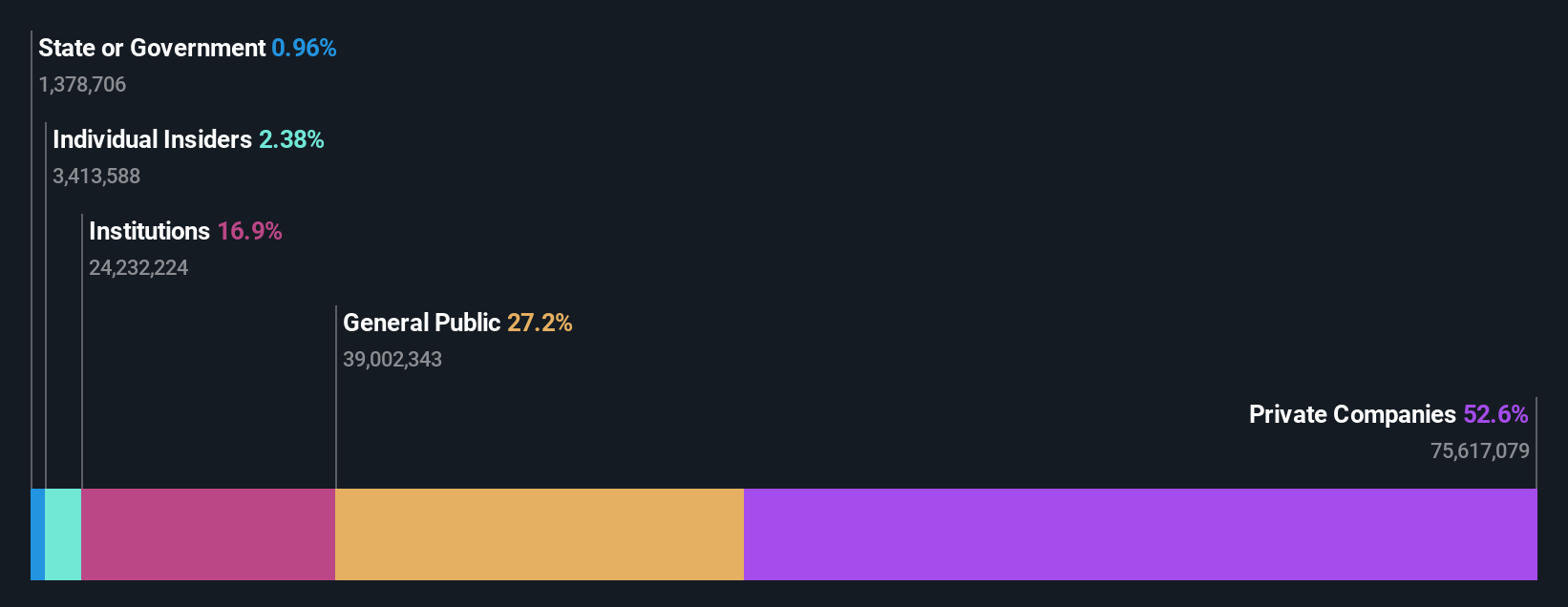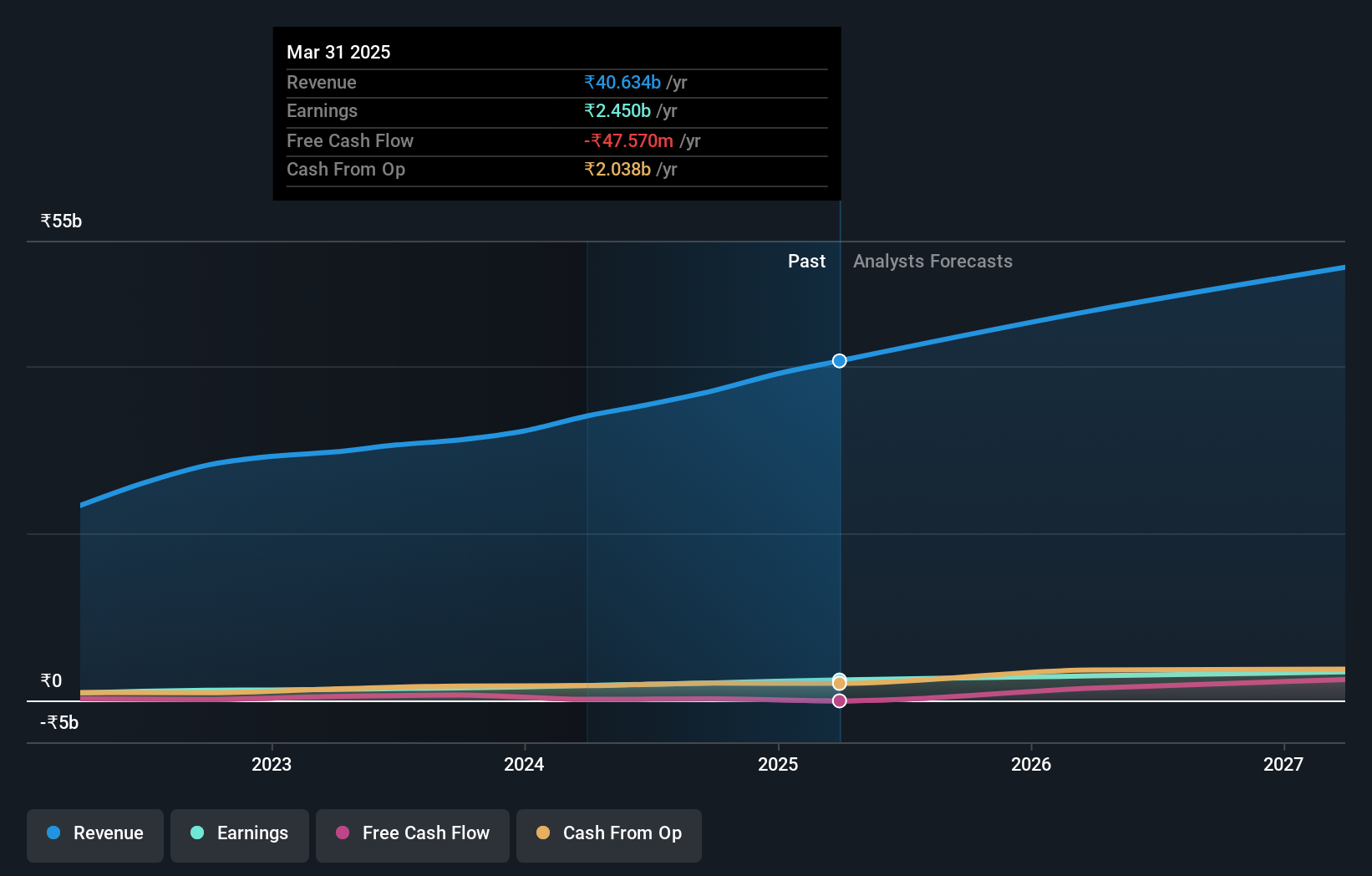- India
- /
- Auto Components
- /
- NSEI:GABRIEL
Private companies among Gabriel India Limited's (NSE:GABRIEL) largest stockholders and were hit after last week's 7.4% price drop
Key Insights
- The considerable ownership by private companies in Gabriel India indicates that they collectively have a greater say in management and business strategy
- 53% of the company is held by a single shareholder (Asia Investments Pvt. Ltd.)
- Institutional ownership in Gabriel India is 17%
If you want to know who really controls Gabriel India Limited (NSE:GABRIEL), then you'll have to look at the makeup of its share registry. And the group that holds the biggest piece of the pie are private companies with 53% ownership. That is, the group stands to benefit the most if the stock rises (or lose the most if there is a downturn).
As a result, private companies as a group endured the highest losses last week after market cap fell by ₹6.8b.
Let's take a closer look to see what the different types of shareholders can tell us about Gabriel India.
Check out our latest analysis for Gabriel India

What Does The Institutional Ownership Tell Us About Gabriel India?
Institutions typically measure themselves against a benchmark when reporting to their own investors, so they often become more enthusiastic about a stock once it's included in a major index. We would expect most companies to have some institutions on the register, especially if they are growing.
Gabriel India already has institutions on the share registry. Indeed, they own a respectable stake in the company. This implies the analysts working for those institutions have looked at the stock and they like it. But just like anyone else, they could be wrong. When multiple institutions own a stock, there's always a risk that they are in a 'crowded trade'. When such a trade goes wrong, multiple parties may compete to sell stock fast. This risk is higher in a company without a history of growth. You can see Gabriel India's historic earnings and revenue below, but keep in mind there's always more to the story.

Hedge funds don't have many shares in Gabriel India. Our data shows that Asia Investments Pvt. Ltd. is the largest shareholder with 53% of shares outstanding. With such a huge stake in the ownership, we infer that they have significant control of the future of the company. For context, the second largest shareholder holds about 9.8% of the shares outstanding, followed by an ownership of 1.5% by the third-largest shareholder.
While studying institutional ownership for a company can add value to your research, it is also a good practice to research analyst recommendations to get a deeper understand of a stock's expected performance. There are plenty of analysts covering the stock, so it might be worth seeing what they are forecasting, too.
Insider Ownership Of Gabriel India
While the precise definition of an insider can be subjective, almost everyone considers board members to be insiders. Management ultimately answers to the board. However, it is not uncommon for managers to be executive board members, especially if they are a founder or the CEO.
Most consider insider ownership a positive because it can indicate the board is well aligned with other shareholders. However, on some occasions too much power is concentrated within this group.
We can report that insiders do own shares in Gabriel India Limited. In their own names, insiders own ₹2.0b worth of stock in the ₹86b company. It is good to see some investment by insiders, but it might be worth checking if those insiders have been buying.
General Public Ownership
The general public, who are usually individual investors, hold a 27% stake in Gabriel India. While this size of ownership may not be enough to sway a policy decision in their favour, they can still make a collective impact on company policies.
Private Company Ownership
It seems that Private Companies own 53%, of the Gabriel India stock. It's hard to draw any conclusions from this fact alone, so its worth looking into who owns those private companies. Sometimes insiders or other related parties have an interest in shares in a public company through a separate private company.

Next Steps:
It's always worth thinking about the different groups who own shares in a company. But to understand Gabriel India better, we need to consider many other factors. Consider for instance, the ever-present spectre of investment risk. We've identified 2 warning signs with Gabriel India (at least 1 which is significant) , and understanding them should be part of your investment process.
If you would prefer discover what analysts are predicting in terms of future growth, do not miss this free report on analyst forecasts.
NB: Figures in this article are calculated using data from the last twelve months, which refer to the 12-month period ending on the last date of the month the financial statement is dated. This may not be consistent with full year annual report figures.
New: Manage All Your Stock Portfolios in One Place
We've created the ultimate portfolio companion for stock investors, and it's free.
• Connect an unlimited number of Portfolios and see your total in one currency
• Be alerted to new Warning Signs or Risks via email or mobile
• Track the Fair Value of your stocks
Have feedback on this article? Concerned about the content? Get in touch with us directly. Alternatively, email editorial-team (at) simplywallst.com.
This article by Simply Wall St is general in nature. We provide commentary based on historical data and analyst forecasts only using an unbiased methodology and our articles are not intended to be financial advice. It does not constitute a recommendation to buy or sell any stock, and does not take account of your objectives, or your financial situation. We aim to bring you long-term focused analysis driven by fundamental data. Note that our analysis may not factor in the latest price-sensitive company announcements or qualitative material. Simply Wall St has no position in any stocks mentioned.
About NSEI:GABRIEL
Gabriel India
Manufactures and sells of ride control products to the automotive industry in India, the Netherlands, and internationally.
High growth potential with solid track record.
Similar Companies
Market Insights
Community Narratives




